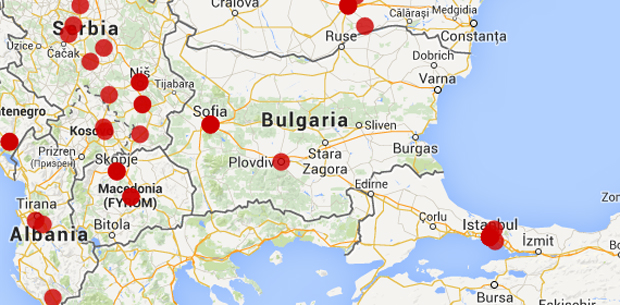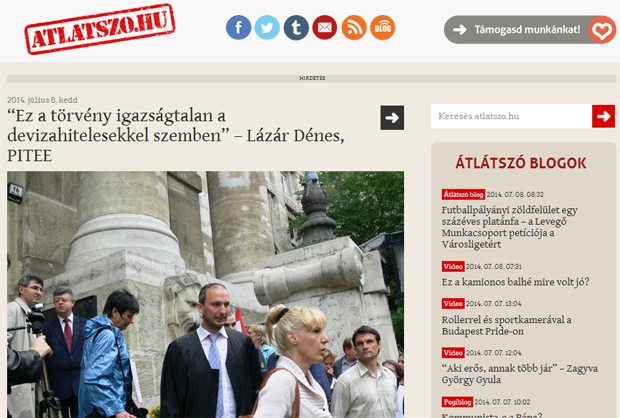Index relies entirely on the support of donors and readers to do its work.
Help us keep amplifying censored voices today.

Index on Censorship and Osservatorio Balcani e Caucaso are joining forces to map the state of media freedom in Europe. With your participation, we are mapping the violations, threats and limitations that European media professionals, bloggers and citizen journalists face everyday. We are also collecting feedback on what would support journalists in such situations. Help protect media freedom and democracy by contributing to this crowd-sourcing effort.
Bulgarian journalists covering the financial beat can breathe freely as the most controversial parts of the so-called “bank censorship” amendment to the criminal code have been removed by the legal committee of the national assembly.
In July, parliament adopted the amendment on first reading. The text of the draft outlined sentences of two to five years in prison for circulating “false or misleading information” about banks that could “cause panic”.
The amendment was suggested indirectly by the Bulgarian National Bank (BNB) after a series of bank runs involving Bulgaria’s fourth largest credit institution, the Corporate Commercial Bank (CCB) and later an unrelated run involving financial institution the First Investment Bank (FIB).
It is still unclear who was behind these incidents. The run against CCB was likely caused by disagreements between media tycoon Delyan Peevski, one of the CCB’s large depositors and his old friend, Tsvetan Vasilev, the owner of CCB. Peevski started to remove funds, sparking a bank run which undermined the bank’s liquidity.
In the FIB case, three people have been arrested. They are suspected of spreading rumours about the imminent bankruptcy of FIB via emails and short text messages to the bank’s clients. This stirred mass panic, as people rushed to withdraw their money from the bank: in a few hours, BGN 800 million (£327 million) were withdrawn.
“Society is very sensitive especially to issues that affect the financial and banking stability as the memory of the banking crisis in 1996-1997 is still fresh,” said Petya Stoyanova, a financial and banking journalist from Bulgaria. During that crisis, 14 Bulgarian banks collapsed.
The memory of the mid-1990s financial crisis is the main reason behind the low public confidence in the Bulgarian banking system, which can easily be moved to panic. As a response, BNB proposed an amendment to the criminal code on 1 July stating that those who “disseminate misleading or untrue information on a bank or a financial institution that could create panic among the population, be punished with five to 10 years of imprisonment”.
BNB also proposed a fine ranging between BGN 5,000 and BGN 10,000 (£4,061) to be imposed in such cases. People causing significant damage or those having received significant illegal revenues through the aforementioned activities would be punished the same way.
According to Stoyanova, the proposals have been criticised by politicians and lawyers because of its vague language which, in a broad interpretation, could lead to a conviction for dissemination of any information related to the banking sector, even if it is not false or misleading.
After the first reading of the amendment in parliament, members of the legal committee applied a number of corrections. The revised amendment removes the danger of censorship by tightening up the language, which now refers to disseminating “false” banking information. While the potential fines for those spreading such information were increased, the possibility of prison has been eliminated.
The banking scandals hinted at the dimensions of backstage political machinations in Bulgaria. Stoyanova believes responsibility for malicious behaviour should have a place in future changes to the criminal code. Future lawmakers, she said, should not be allowed to quickly alter laws in violation of rules and best legislative practices, without public discussion.
The second reading of the amendment will be left to the next national assembly, as parliamentary elections will be held on 5 October.
More reports from Bulgaria via mediafreedom.ushahidi.com
Election law amendment could limit press freedom
Attacker sprays substance in Bulgarian sports journalist’s face
Bulgarian journalist beaten by football fans
Newspaper reporters attacked, threatened in Bulgaria’s city of Plovdiv
Arson Attack Against Bulgarian Journalist Genka Shikerova
This article was posted on 13 August 2014 at indexoncensorship.org

Hungarian NGOs are facing a rough summer: The Government Control Office (KEHI) has launched a series of investigations into grants they received from the Norway Financial Mechanism. Now the Council of Europe’s Commissioner for Human Rights, Nils Muižnieks, has written to János Lázár, Minister of the Prime Minister’s Office to express concern over the situation.
In the letter, Muižnieks told Lázár that he had been informed by several parties that audits were being conducted over the grants. A forthcoming report will further detail the monitoring that Muižnieks was conducting around media freedom in the country. For his part, Lázár has responded to the letter from the COE commissioner.
As Index reported on July 8, the government controls come after a long smear campaign with members of the Fidesz government accusing these NGOs to be proxies for “foreign interests”, and that Norway is using the program to exert direct political influence on Hungary.
“There is panic and uncertainty in the Hungarian civil society. In this respect, the controls are very effective, even if there will be no consequences,” says Tamas Bodoky, editor-in-chief of Atlatszo.hu, an investigative journalism outlet also targeted by the KEHI audit.
Atlatszo.hu decided not to comply with the government inspection, regarding it as unlawful. They say that KEHI is an agency overseeing government financial matters, and does not have the authority to investigate financing for NGOs. However, they have nothing to hide, so they published all relevant records concerning the use of funds on the website of their partner organisation, Asimov Foundation.
A number of NGOs followed Atlatszo’s example, but it is unclear what the repercussions of this decision might be. According to Bodoky, KEHI could freeze their bank accounts, suspend their VAT number, and fine them as well.
It is difficult to portray these NGOs as strongly opposing the Fidesz rule. Some of the organisations receiving grants from the Norway Financial Mechanism have been involved in anti-government protests, but others have fruitful cooperation with the government. The vast majority of grant recipients have no political involvement at all.
Bodoky believes the government controls are a small-time retaliation for the decision of the Norwegian government to suspend the payments from the EEA and Norway Grants. This fund represents the financial contribution of Norway, Iceland and Liechtenstein towards reducing economic and social disparities in the European Economic Area (EEA).
Hungary was set to receive 20 billion euros in the 2014-2020 period from this fund. However, the Hungarian government recently made important changes to the system by which EU and Norway development grants are administered. They did not consult with the donors. As a result the Norwegian government suspended the payments.
This measure did not affect the considerably smaller NGO Fund, operated by a Hungarian consortium of NGOs. The overall objective of this fund is to “strengthen civil society development and enhance contribution to social justice, democracy and sustainable development”.
The programme focuses on projects dealing with the human rights of minorities, good governance, combating racism and xenophobia, combating discrimination, social exclusion, gender inequalities and gender-based violence.
Some members of the NGOs administering the fund appear to have links to Politics Can Be Different (LMP), a small liberal party. Apparently this was the reason why State Secretary Janos Lazar, the “strong man” of the Fidesz government decided to write an open letter to the official representative of the Fund’s donors, Vidar Helgesen, Norway’s Minister of EEA and EU Affairs, accusing the Norway government of intervention into the internal affairs of Hungary.
Deputy State Secretary Nandor Csepreghy said in an interview that the Hungarian government would prefer Norway’s Civil Fund to provide financial support through the Hungarian government, whose “legitimacy comes from society and the voters”. Csepreghy believes that any other scheme can be interpreted as a direct involvement into Hungary’s internal political affairs.
Recent reports from mediafreedom.ushahidi.com:
Hungary: Companies owned by local council abrogate advertising contracts
Hungary: Investigative journalism group says it will not comply with government audit
Hungary: Officials target RTL Klub after critical reports
Hungary: NGO with close ties to Hungarian government will ‘monitor’ media attacks
Hungary: Blogger resigns after political pressure
This article was posted on July 8, 2014 at indexoncensorship.org